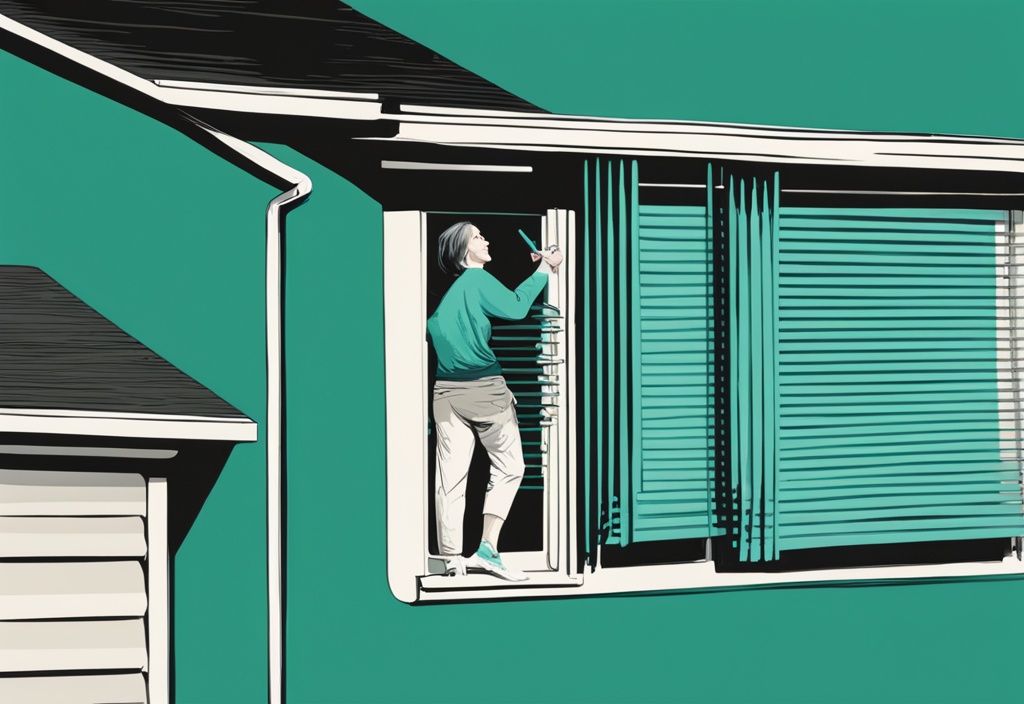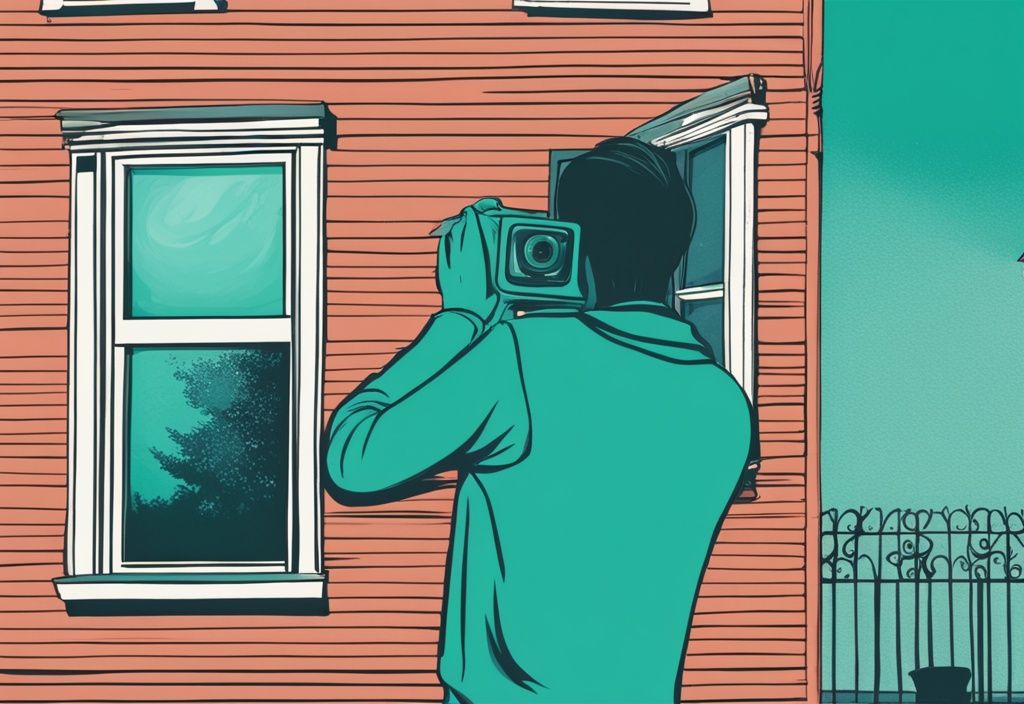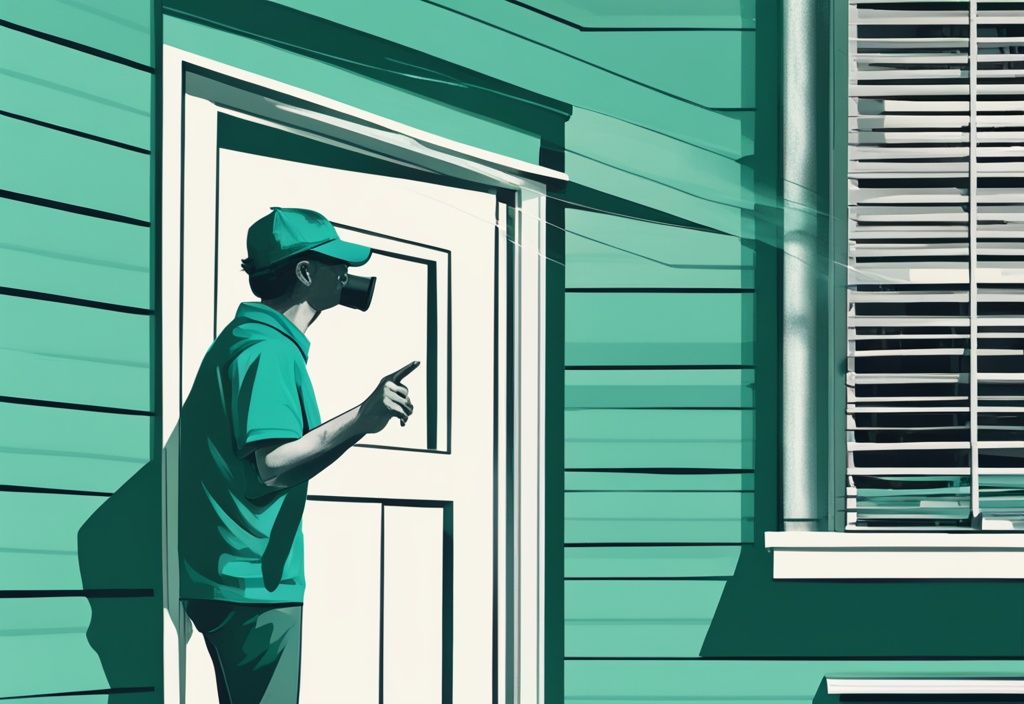Neighbor’s Camera at Your House? Here’s What to Do
Can you imagine looking out your window to find your neighbor’s camera pointed directly at your house? It’s unsettling, isn’t it? And you may be asking yourself, is this even legal? As a seasoned home security expert, I’ve seen it all and I’m here to help you navigate this delicate situation.
In this article, we’ll delve into the legality of this issue, guide you on how to document it, and explore ways to communicate with your neighbor about it. We’ll also discuss when it might be necessary to seek professional legal advice.
So, if you’re grappling with what to do if your neighbor has a camera pointed at your house, read on. We’ve got practical, clear-cut solutions to help you reclaim your privacy.
Understanding the Legality of Your Neighbor’s Security Camera
Is It Legal for Neighbors to Have Security Cameras?
In most cases, it’s legal for neighbors to have security cameras on their property. These devices are often used for security purposes and can help deter crime. However, this legality comes with certain conditions. If you’re concerned about what to do if your neighbor has a camera pointed at your house, it’s important to understand that while the general use of security cameras is allowed, there are exceptions. Specifically, the camera should not intrude on your privacy. This means that cameras should not be directed towards private areas such as your backyard or into the windows of your home. If the camera’s view includes these private areas, it may be considered an invasion of privacy.
Privacy Laws and Security Cameras
Privacy laws play a crucial role in determining what to do if your neighbor has a camera pointed at your house. One key aspect of these laws is that your neighbor cannot record you without your consent, particularly when it comes to audio recordings. If the security camera captures footage of the inside of your home, this likely constitutes a privacy violation. However, it’s important to note that in areas like your front yard, where there is generally no reasonable expectation of privacy, recording is usually legal. Understanding these nuances in privacy laws, including state-specific regulations on security cameras, can help you navigate the situation more effectively. For more detailed information, visit this resource on security camera laws.
State and Local Regulations
State and local regulations can vary significantly when it comes to the placement and use of security cameras. If you’re unsure about what to do if your neighbor has a camera pointed at your house, it’s essential to familiarize yourself with the specific laws in your area. Some states and localities may have stricter rules regarding where cameras can be placed and what they can record. Additionally, if you live in a community with a Home Owner’s Association (HOA), there may be additional guidelines and restrictions. Involving the HOA or Property Management can provide clarity and help you understand the specific regulations that apply to your situation.
Assessing the Situation
When faced with the concern of *what to do if your neighbor has a camera pointed at my house*, it’s crucial to take a methodical approach. This section will guide you through identifying the camera’s coverage and determining if it invades your privacy.
Identifying the Camera’s Coverage
Start by observing the positioning of your neighbor’s security cameras. Are they directed towards your property? Pay close attention to areas like your front yard, backyard, or windows. This initial observation will help you gauge the extent to which your privacy might be compromised.
Next, engage in a conversation with your neighbor. Politely ask if you can view the camera feeds. This request can help clarify what areas are being recorded and whether your private spaces are within the camera’s field of view. Understanding the camera’s coverage is crucial in determining the next steps to protect your privacy.
Determining Privacy Invasion
Once you have identified the coverage, the next step involves assessing whether the camera constitutes a privacy invasion. Consider the specific areas being recorded. If the camera captures footage of private spaces such as your backyard or the interior of your home through windows, it likely represents a significant invasion of privacy. These areas are generally considered private, and recording them without consent can be problematic.
Additionally, evaluate whether the camera’s presence causes you discomfort or anxiety. Does it make you feel uneasy? If the camera is excessively intrusive or compromises your sense of security, it’s essential to address these concerns promptly.

By carefully identifying the camera’s coverage and assessing potential privacy invasions, you can take informed steps to protect your privacy and find a resolution to the issue.
Communicating with Your Neighbor
The first step in addressing what to do if your neighbor has a camera pointed at my house is to initiate a friendly and open conversation with your neighbor. Approach them calmly and explain your concerns about the camera’s placement and how it affects your privacy. Clearly state why you feel uncomfortable and provide specific examples of how the camera’s current positioning intrudes on your personal space. Effective communication is essential to resolving the issue amicably and finding a mutually agreeable solution.
Initiating a Conversation
Imagine sitting down with a friend over coffee to discuss a concern. That’s the tone you want to strike when talking to your neighbor about their camera. Start by approaching them calmly and explaining your concerns.
Why does the camera’s placement bother you? Give specific examples of how it invades your privacy. Maybe it overlooks your backyard where your kids play, or it captures your living room through a window.
Effective communication is key. By clearly stating your discomfort and providing concrete examples, you pave the way for a constructive dialogue. This approach can help you both find a solution that respects your privacy while addressing their security needs.
Requesting Adjustments to the Camera
If your initial conversation doesn’t lead to a satisfactory outcome, don’t lose hope. There are still steps you can take.
First, politely ask your neighbor to reposition the camera. Suggest they adjust it to focus more on public areas or their own property. This simple change can significantly reduce the intrusion on your privacy.
Another option is to request privacy masks. These are digital overlays that block out specific areas from being recorded. By adding these masks, your neighbor can ensure that your property isn’t captured in the footage.
Additionally, ask if they can disable motion detection alerts triggered by activities on your property. This can help reduce the feeling of constant surveillance.
If verbal communication doesn’t work, consider writing a formal letter. Reiterate your concerns and the adjustments you’re requesting. Keep a copy for your records. This letter can serve as documentation of your efforts to resolve the issue amicably.

Taking Further Steps
When your neighbor’s camera is pointed at your house, it’s crucial to know your options. Here’s a clear path forward.
Contacting Authorities
If your neighbor won’t cooperate about their security camera, it might be time to get the authorities involved. Start by contacting the police to see if there’s a potential privacy law violation. The police can check if your neighbor’s actions are infringing on your rights. Feeling threatened or harassed by the camera? Filing a police report is essential. It ensures your safety and creates an official record of the incident.
Seeking Legal Advice
Think your privacy is being compromised by your neighbor’s camera? Seeking legal advice is a smart move. A lawyer can explain your rights and the legal options available. Legal action should be a last resort, only after direct communication with your neighbor has failed. In extreme cases, you might need a restraining order to stop further privacy violations. But remember, this step should be taken only when all other avenues are exhausted.
Documenting the Situation
Thorough documentation is key when dealing with privacy issues related to your neighbor’s security camera. Take clear photos or videos showing the camera’s position and field of view. Keep detailed records of all interactions with your neighbor about the camera. Note dates, times, and the nature of each communication. This documentation can be invaluable if you need to escalate the issue to authorities or seek legal help. It provides a clear and comprehensive account of the situation.
Practical Solutions for Privacy
When dealing with the issue of what to do if your neighbor has a camera pointed at my house, there are several practical solutions to consider. These methods can help you maintain your privacy and ensure your home remains a sanctuary.
Using Window Treatments
Enhancing your window treatments is a straightforward way to tackle the problem. Think about curtains, blinds, and window film. These can act as excellent barriers to prying eyes. Curtains and blinds come in various styles and materials, so you can pick options that match your home’s interior design while providing privacy.
Window film is another versatile option. It can obscure the view into your home without blocking natural light. By applying frosted or tinted window film, you can maintain your privacy without compromising on brightness. Plus, these treatments add an extra layer of insulation, potentially reducing your energy costs.
Installing a Privacy Fence
Another practical approach is to install a privacy fence. A well-constructed fence can effectively block the view into your backyard, ensuring that your private outdoor space remains just that—private. Privacy fences come in various materials, including wood, vinyl, and composite. Each offers different levels of durability and aesthetic appeal.
Additionally, planting trees or tall shrubs along your property line can serve as a natural barrier. This greenery not only obstructs the camera’s view but also enhances the beauty of your yard. Imagine a serene environment where you can relax without worrying about prying eyes. Whether you opt for a traditional fence or a natural screen of foliage, these solutions can significantly improve your property’s privacy and curb appeal.
FAQ
Is it legal for my neighbor to point a camera at my house?
Generally, it is legal, but it should not intrude on private areas like your backyard or inside your home. If you believe the camera is violating your privacy, you may need to take further steps.

What to do if your neighbor has a camera pointed at my house?
If verbal communication fails, write a formal letter expressing your concerns. Keep a copy for your records. If the issue persists, contact the police or seek legal advice to understand your options.
Can I block my neighbor’s camera view?
Yes, you can use window treatments such as curtains, blinds, or window film to block the camera’s view into your home. Additionally, installing a privacy fence or planting trees can help obstruct the camera’s line of sight to your backyard.
When should I contact the police about my neighbor’s camera?
Contact the police if you feel your privacy is being violated or if you feel threatened or harassed. The police can investigate whether there is a potential violation of privacy laws.
How can I document the situation effectively?
Take photos or videos showing the camera’s position to provide evidence. Keep detailed records of all communications with your neighbor regarding the issue, including dates and the content of conversations.
Conclusion
Security cameras can be a powerful tool for enhancing safety and deterring potential criminal activities. However, their installation and usage must be balanced with respect for privacy to prevent any undue intrusion. If you find yourself in a situation where your neighbor has a camera pointed at your house, it is crucial to handle the matter thoughtfully and responsibly.
Clear communication with your neighbor is the first and most important step. Express your concerns calmly and clearly, explaining how the camera’s positioning affects your privacy. Most neighbors are willing to find a mutually agreeable solution when approached respectfully.
If direct communication does not yield satisfactory results, it may be necessary to take further steps. Contacting authorities, such as the police or a local Home Owner’s Association (HOA), can provide additional support and guidance. Consulting with a legal professional can also be beneficial if you believe your privacy rights are being violated.
Practical solutions can also help protect your privacy without escalating the situation. Installing window treatments, such as curtains or blinds, can block the camera’s view into your home. Additionally, a privacy fence or strategically placed plants can shield your backyard from unwanted surveillance.
In conclusion, while security cameras have their merits, they must be used responsibly to avoid infringing on others’ privacy. Addressing the issue with your neighbor through clear communication is essential. If necessary, do not hesitate to involve authorities or seek legal advice. Employing practical solutions like window treatments and privacy fences can also help safeguard your privacy effectively.
I’m James Albright, a home security expert with over 15 years of experience, and I’m passionate about helping families protect what matters most. After serving as a police officer, I transitioned to security consulting to share my hands-on knowledge and practical tips. My mission is to make home security simple and reliable by offering clear, no-nonsense advice and easy-to-follow guides. When I’m not reviewing the latest security tech or writing, I’m out in the community leading neighborhood watch programs and, most importantly, keeping my own family safe.





Post Comment